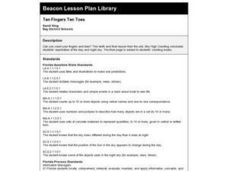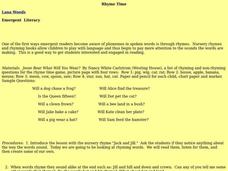Curated OER
Astronomy Merit Badge
Students explore astronomy through the Starry Night Constellation Adventure software. They print star charts and identify constellations. They sketch the Big Dipper and describe the Milky Way. They list the five most visible planets and...
Curated OER
An Introduction to the Night Sky and Movement Astronomy
Basically, this is an interactive exploration of educational astronomy software and an app. Young astronomers discover how the apparent motion of the sky relates to Earth's movements and the position of the observer. It is out of this...
Curated OER
The Solar Cycle
Learners research the solar cycle. In this Science lesson, students use the internet to investigate the solar cycle. Learners produce a spreadsheet and graph from the information collected.
Curated OER
Sky 2: Shadows
Students explore space science by participating in a shadow experiment. In this sky observation lesson, students identify how the sun creates different sized shadows by moving across the horizon. Students utilize yard sticks, markers,...
Curated OER
Solar System (Lesson 2)
Eighth graders identify the objects that make up the solar system. They define new vocabulary and practice using them. They discover that the sun is a star.
Curated OER
Measuring the Speed of Light
Learners explore physics by completing measurement problems in class. In this speed of light lesson, students discuss the importance of knowing the speed of light and how it affects many aspects of human life on Earth. Learners identify...
Curated OER
Solar System
In this space activity, students identify and locate vocabulary terms and names related to the Solar System. There are 23 words located in the puzzle.
Curated OER
Space Search
For this space worksheet, students identify and locate vocabulary terms and names related to space. There are 26 words located in the puzzle.
Curated OER
Sky 3: Modeling Shadows
Students will construct models to demonstrate their understanding of shadows. Many questions and suggestions for variants on the activities are presented to allow you to tailor this lesson to your particular needs. It is best to make the...
Curated OER
Science: Bees: An Interdisciplinary Approach
Students investigate the world of bees and describe their characteristics. by identifying the bees' parts, they demonstrate how these parts function. In the lab, students dissect bees and view the various parts under microscopes. ...
Curated OER
Our Place in Space
Third graders identify the different planets that make up the solar system. In this space science lesson, 3rd graders construct a scale model of the major planets. They explore their different unique features and dress up as planets.
media.yurisnight.net
Science Lesson Plan: Our Solar System: I Wonder?
Ever wonder why Pluto isn't considered a planet? Or how large the Earth is compared to the other inner planets? Explore the universe with a series of projects that simulate different aspects of our solar system. The activities require...
Curated OER
Space Words and Comparatives
Which is bigger: the sun or the moon? Which is nearer: the planets or a star? English Language Learners first located a series of space-related nouns and adjectives in a word search, and then identify the comparative and superlative...
Curated OER
Retrograde Motion
Students study the motions of the heavenly bodies. In this space lesson students use models to show a variety of schemes explaining the motions.
Curated OER
Our Changing View of the Solar System
Students identify and name the eight planets and the five dwarf planets in our solar system. In this space science lesson, students view a slideshow of the planets and label them on an included Solar System chart.
Curated OER
Sky 2: Shadows
students will explore making shadows and tracking the movement of an object over the course of a day to look for patterns. It is best to couple this shadow activity with reading the book, Bear Shadow, and making a map of Bear's...
Curated OER
Objects in the Sky
Students explore what the sky looks like at different times. They identify objects in the sky and recognize changes over time. Students observe the sky and look for objects that are common in both the daytime and the nighttime sky.
Curated OER
The 'Solar' System Past and Present
Students identify cardinal and intermediate directions, recognize that models changes due to new or improved observations and technology, identify the major characteristics of the planets including their positions in the solar system,...
Curated OER
Sextant Measurements
Students create a sextant. Using their sextant, students measure the height of tall objects. Students explore how sailors used sextants to identify their location on the ocean. They research how sextants are created.
Curated OER
Ten Fingers Ten Toes
First graders identify the number 10 by completing a page for a counting book. They add the page to the first nine pages.
Curated OER
Conditional Statements and Converses
In this conditional statements and converses worksheet, 9th graders solve and complete 10 various types of statements as instructed. First, they identify the hypothesis and conclusion of the conditional statement given. Then, students...
Curated OER
How Do Clouds Form?
Students describe how they believe clouds form. They observe the different types of clouds they see and identify the types. They examine what affects the size and shape of clouds.
Curated OER
Rhyme Time
Students explore phonemes through rhymes. They discuss nursery rhymes and rhyming words. Students read "Jack and Jill" and discuss the rhyming words in the nursery rhyme. They play a rhyming game and identify words that rhyme.
Curated OER
Poetry in Weather
Students observe and identify the various types of clouds. They compare clouds to clouds on a chart, and in small groups compose and present a group poem about clouds and weather.

























